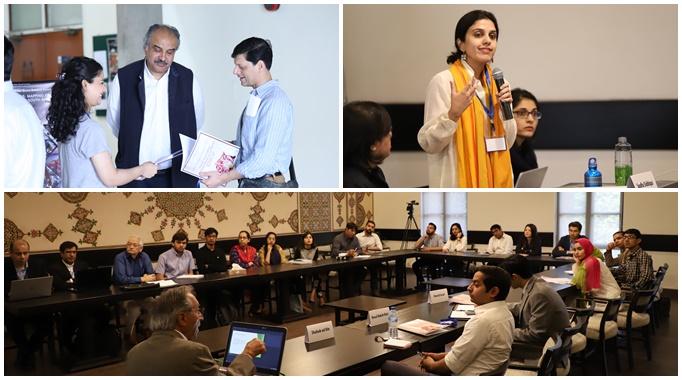
The Department of Humanities and Social Sciences at Mushtaq Gurmani School of Humanities and Social Sciences, LUMS hosted its Thirteenth Annual Conference from April 10-11, 2019. The conference was co-sponsored by the Shahid Hussain Foundation and the Mahbub-Ul-Haq Research Centre at LUMS.
The theme for this year’s conference was ‘Critical Interventions: Mapping Emerging Scholarship on South Asia’, and was convened by Dr. Saba Pirzadeh and Dr. Sameen Mohsin Ali. The conference brought together humanities and social sciences scholars whose work interrogated the concept of South Asia as reality and construct. The two-day conference consisted of 30 panels with presentations by over 100 scholars from Pakistan, India, the UK, France, the US, and Canada.
The panels showcased research on a variety of subjects such as regional conflict, nationalist formations, urban development, political governance, education reform, gender contestations, indigenous literature, knowledge production, popular culture, and environmental concerns.
There were two keynote addresses. The first was delivered by Dr. Asma Abbas, Professor of Politics and Aesthetics at Bard College and Dean at Indus Valley School of Art and Architecture, Karachi. Dr. Abbas’s address ‘Anticolonial Maps for Lost Lovers: Notes on the Aesthetics and Politics of Method’ explored the entrapments of neoliberal knowledge production and social reproduction that predominate in the wider post-colony.
The second keynote address was delivered by Professor Jamal J. Elias, Professor of Humanities and Islamic Studies at the University of Pennsylvania. In his lecture ‘Beyond the Narrative: Recovering the Personal and Emotional in History’, Dr. Elias located the personal as an important motivator in human actions and argued for the importance of human experience as a valid source of information and motivation in writing historical narratives.
The first day of the conference included the launch of the Mahbub-Ul-Haq Research Centre (MHRC) with a discussion on ‘Humanizing the State: Mainstreaming Human Security in Pakistan’s National Security Narrative’. The centre also hosted a panel on ‘Women in Politics’ with Members of the Provincial Assembly, Hina Parvez Butt, Maleeha Bokhari, and Malaika Raza.
An art exhibit, Dhaak Ke Teen Pat (Three Leaves of the Flaming Tree), ran in parallel to the conference. Bibi Hajra Cheema exhibited work that focuses on the role of trees in a rapidly changing Lahore. She spoke about her inspiration from Punjabi folklore that featured trees as sites of women’s agency, romance, physical and emotional healing, and divinity.
The conference was well-attended by a large number of people including students and academics from across Lahore. The conference concluded with a commitment to developing a critical discourse on South Asia through a critique of reductive stereotypes, emphasis on multidisciplinary knowledge, and the promotion of transnational academic networks.








